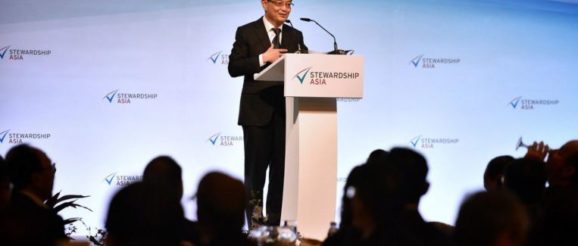Businesses must invest in innovation, workers and community to move forward: DPM Heng, Singapore News & Top Stories – The Straits Times

SINGAPORE – Against the backdrop of rapidly emerging new technology, less support for globalisation and Asia’s growing power, business leaders must invest in innovation, workers and the community to move forward, Deputy Prime Minister Heng Swee Keat said on Tuesday (June 4).
Speaking to 200 business leaders at the annual corporate governance forum Stewardship Asia Roundtable, Mr Heng urged companies to be “quick to innovate, in order to stay relevant and competitive.”
This is especially so as technology advances, and global economic and strategic weight shifts towards Asia, which is likely to change how supply chains work.
“Leaders need to take ownership by charting a path of future growth through innovation, and energising their teams around this,” he said.
He added that firms should learn about new developments in technology and see how these can be integrated into existing business processes, and create new value.
Innovation also helps companies create new products and services, which leads to the re-design of jobs and work processes, he said. This in turn helps workers earn higher wages from better jobs.
“The relationship between companies and workers is a mutually reinforcing one – more competitive companies provide better jobs, and highly skilled workers make companies stronger, more productive, and more competitive,” Mr Heng said.
He cautioned that during the period of innovation and transformation, there would be “trade-offs between short-term returns, which drive many shareholder decisions, and long-term growth.”
“Companies must be prepared to plan and invest in innovation for the long term,” he said.
He noted the Government’s support for economic restructuring through its 23 Industry Transformation Maps covering 80 per cent of the economy.
Another area to invest in is people, because “the long-term growth of our businesses is only as good as the capabilities and skills of our workers,” said Mr Heng.
Programmes like SkillsFuture and Professional Conversion Programmes have helped workers to pick up new and relevant skills, to be used in an increasingly technology-intensive work environment.
Companies should also look after the health, safety and welfare of their workers, Mr Heng said, adding that they can adopt progressive employment best practices and promote fairer workplaces.
In addition, firms should contribute to the community and take care of the needy and vulnerable.
“Companies should not just do well, they should also do good,” Mr Heng said, adding that firms can offer their expertise and resources, and mobilise employers to create sustainable corporate social responsibility initiatives.
Businesses can also work together and with non-profit organisations to achieve more impactful outcomes.
To complement these efforts, the Government has several initiatives, such as a scheme to give firms a 250 per cent tax deduction on qualifying expenditure when they send employees to volunteer at qualifying charities.
Mr Heng said that stewardship is about “engaged, responsible and meaningful value creation over the long term.”
“This focus on the long term is important, especially when change is happening ever faster. Equally, the focus is not just on the company itself, but the benefit to the larger community. As good stewards, leaders have to continuously invest in innovation, people and the community,” he added.
Besides Mr Heng’s keynote speech, the roundtable also saw panel discussions and sharing sessions by leaders such as Grab co-founder Tan Hooi Ling and Singtel chairman Simon Israel.
